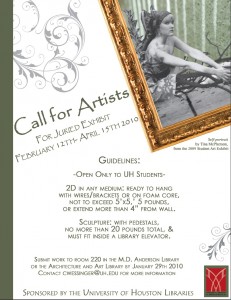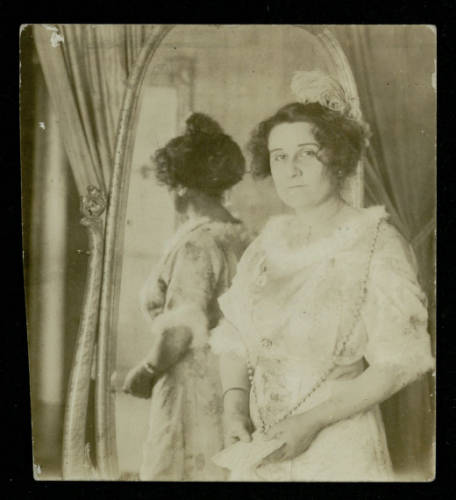Bryan Museum Exhibit: La Cruz Blanca
A special exhibit at Galveston’s Bryan Museum features items from the University of Houston Libraries Special Collections’ Leonor Villegas de Magnón Papers. A digital collection is available online.
Magnón, a Mexican citizen and life-long resident of Laredo, Texas, was a trailblazer and leading force on a variety of issues related to Mexicans and Mexican-Americans. Among her many accomplishments, Magnón founded and financed La Cruz Blanca (The White Cross) to provide more organized medical assistance to soldiers wounded in the Mexican Revolution. More details on this work can be found in her autobiography, La Rebelde (The Lady Rebel). In the years after the Revolution, Magnón opened a bilingual school for children and contributed to female civic organizations in the US and Mexico, traveling back and forth from Laredo until her death in 1955.
“It’s fantastic that more people are getting to know about the Magnón Papers and women’s contributions to history, said Lisa Cruces, Hispanic Collections archivist. “We hope that with the increase in awareness, more scholars will visit our archives and make use of this rich material.”
The new exhibit, which opened June 18, also includes artwork by Mexican painter Diego Rivera and other artifacts pertaining to the Mexican Revolution, loaned by museums, historical societies, and private collections.
Houston History Exhibit Opens at UH Libraries
A new exhibit documenting the rich narrative of Houston’s past opens in June at University of Houston Libraries.
Houston History: Archives, Magazine and Oral History is the visual representation of the Welcome Wilson Houston History Collaborative (formerly known as the Houston History Project), a joint effort designed to expand and improve research on historical perspectives of Houston.
The exhibit illustrates a unique collective endeavor that developed from the vision of Joe Pratt, Cullen Professor of History and Business at UH. In 2003, Pratt moved the Houston History magazine from Houston Public Library to UH, and recognized the opportunity in establishing an archive and oral history repository, in tandem with the publication, to inform and perpetuate scholarship in public history.
While the magazine is the most visible component of the Houston History Collaborative, the archives and oral histories serve as rich entry points to scholarship and research for students and scholars alike. UH students take an active role in the archives, oral histories, and magazine production. Selected content from recent issues of the magazine, including articles written by students, will be featured in the exhibit.
The exhibit was curated by Dr. Terry Tomkins-Walsh, historian, lecturer and archivist of the UH Special Collections Houston History Archives, which supports research in history with primary sources on growth and development along the Gulf Coast. The archives boast a medley of Houston historical perspectives, and reflect major themes in environmentalism, ethnic history and energy. Notable student projects and other scholarship produced with the use of primary resources in the Houston History Archives will be included in the exhibit.
Records related to environmentalism comprise a significant portion of the Houston History Archives. Some of the materials representing Houston’s environmental community include, but are not limited to, the Terry Tarlton Hershey Papers; Bayou Preservation Association; Citizens’ Environmental Coalition; The Park People Records; Kay B. Crooker Papers (city planning); Hana Ginzbarg Papers (Armand Bayou); and the Outdoor Nature Club.
Search finding aids in the Houston History Archives.
The collection also includes records pertaining to urban planning, city beautification, disaster and flooding response, watershed management, as well as insight on the city and county’s historical response to environmental problems such as transportation or air pollution.
Tomkins-Walsh notes that these records highlight a unique, symbiotic relationship between Houston’s environmental and business communities. Although Houston is known for being a pro-growth, pro-development city, environmentalists have tempered this model with concerted efforts to consider the city’s natural beauty.
Beyond environmentalism, the Houston History Archives include records that reflect many other cultural perspectives.
- One of the more versatile collections within Houston History Archives is the Foley’s Department Store Records, often accessed by students and scholars for research on a number of areas including social issues, transportation and retail.
- The Thomas R. Cole Desegregation Papers offer substantial primary sources on several Houston civil rights activists and a significant video study of Houston’s desegregation process, The Strange Demise of Jim Crow (1998).
- The Ninfa Rodriguez Laurenzo Papers include press coverage, business plans, personal and political correspondence, photos, scrapbooks, menus, and other items related to the famous restaurateur’s business life.
- The Ben F. Love Research Collection contains extensive audio recordings of interviews concerning the influential leader, as well as Love’s writings and material pertaining to the merger of Texas Commerce Bancshares, Inc. and Chemical New York Corporation.
- The Joseph S. Cullinan Papers offer an encompassing view into the petroleum industry, land division of the Shadyside subdivision, Cullinan’s Pasadena farm, and his involvement with city improvement efforts, including the founding of the Houston Negro Hospital.
- The John Henry Kirby Papers consist of a manuscript collection documenting the entrepreneur’s lumber and oil businesses, as well as personal and political correspondence.
The Houston oral history repository preserves audio files and transcripts of stories describing the growth and development of the Gulf Coast region. A wide range of subject areas, including business, offshore energy, disaster response and recovery, Mexican American culture, African American history, and philanthropy, to name a few, present multiple viewpoints of Houston’s past.
Oral histories are produced by graduate students and faculty, preserved for the archives, and are prepared for placement in the UH Digital Library, where they become widely accessible online. New oral histories are being added each year.
Visitors are invited to view Houston History: Archives, Magazine and Oral History at the University of Houston MD Anderson Library starting June 12 through December 18, 2015.
For more information, contact Dr. Terry Tomkins-Walsh.
Call for Artists

Call for Artists
The UH Libraries is now accepting artwork for its Third Annual Student Art Exhibit. Artwork may be submitted at both the M.D. Anderson Library (room 220) and the Architecture and Art Library. This is a competitive exhibit, juried by representatives from local museums, art galleries, and the UH School of Art faculty. Work will be accepted through February 2, 2010.
Submission requirements:
2D in any medium: Ready to hang with wires and brackets or on foam core, not to exceed 5’x5′, 5 pounds, or extend more than 4 inches from the wall.
Sculpture: Pedestal required, no more than 20 pounds for work and pedestal combined. Must fit in library elevator.
Contact Catherine Essinger at cwessinger@uh.edu for more information.

